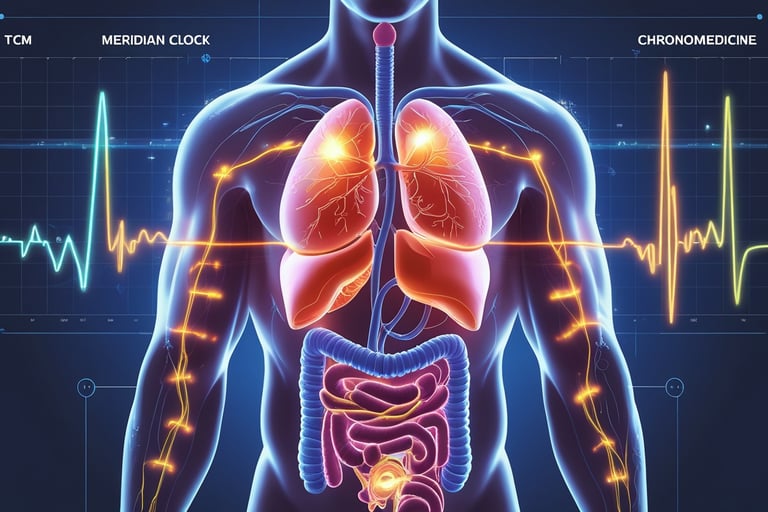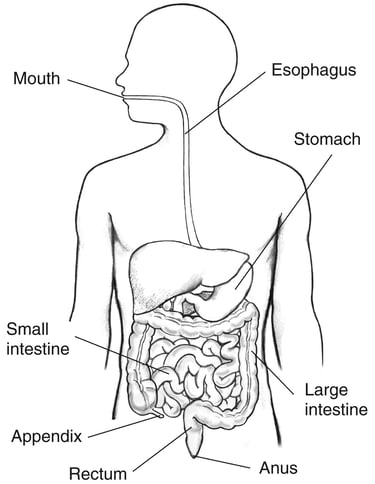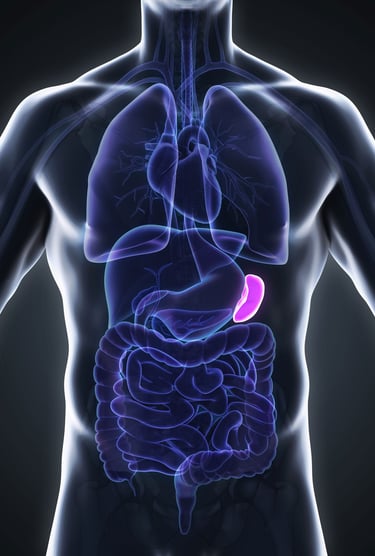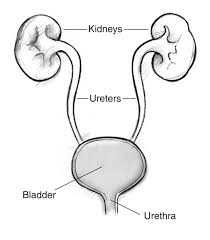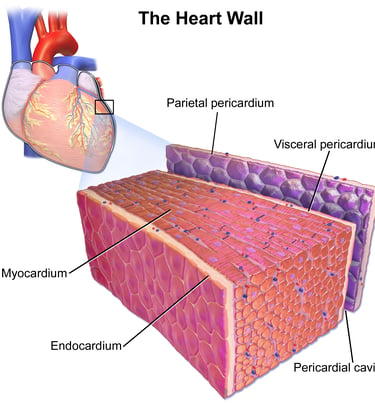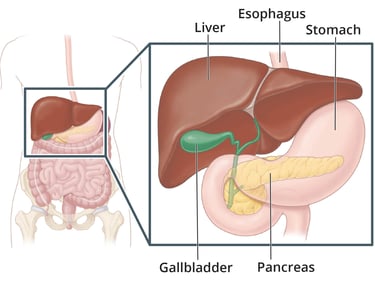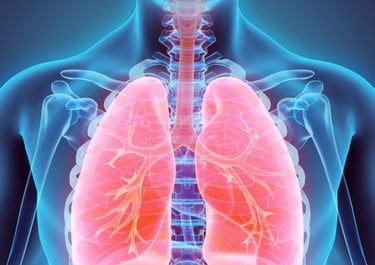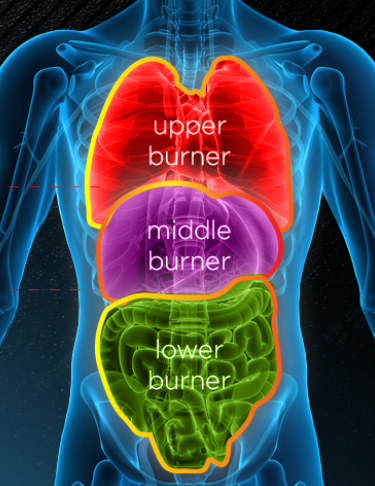The Science of Meridian Times: How the Body’s Internal Clock Impacts Health
3/23/20256 min read


The human body operates on a sophisticated internal clock, often referred to as the circadian rhythm. However, beyond this well-known 24-hour cycle lies a more intricate system known as the Traditional Chinese Medicine (TCM) Meridian Clock, which dictates the optimal functioning of different organs at specific times of the day. This concept, deeply rooted in both ancient wisdom and modern chronobiology, reveals how aligning our daily activities with meridian times can enhance health, prevent disease, and improve overall well-being.
In this blog, we explore the science behind meridian times, their impact on different organs, and practical ways to optimize health by aligning with this natural cycle.
Understanding the Meridian Clock: A Biological Perspective
The TCM Meridian Clock is based on the concept that the body's 12 primary meridians, which correspond to different organs, are most active at specific two-hour intervals in a 24-hour cycle. This system parallels findings in chronomedicine, which studies the influence of time on biological processes and how misalignment can contribute to diseases such as cardiovascular disorders, metabolic syndromes, and even mental health conditions (Roenneberg & Merrow, 2016).
How Meridian Times Regulate Our Body
Each meridian has a peak energy period when its associated organ functions at its highest capacity. Conversely, 12 hours later, that organ is at its weakest. Understanding these time windows allows individuals to optimize activities like eating, sleeping, exercising, and detoxification.
List of Meridian Times and Their Impact on Organ Health
🌅 5 AM – 7 AM: Large Intestine (Elimination & Detoxification)
Best Activities: Wake up early, drink warm water, and allow natural bowel movements.
🔹 Scientific Insight: The gut microbiome follows a circadian rhythm, influencing metabolism and immune function (Thaiss et al., 2016).
🌞 7 AM – 9 AM: Stomach (Optimal Digestion)
Best Activities: Eat a nutrient-dense breakfast with protein and fiber.
🔹 Scientific Insight: Morning digestion is enhanced by peak gastric acid secretion, which boosts nutrient absorption (Crosby et al., 2018).
🌤️ 9 AM – 11 AM: Spleen (Energy & Immunity Boosting)
Best Activities: Engage in mental tasks, avoid sugary foods, and stay hydrated.
🔹 Scientific Insight: The spleen plays a key role in blood filtration and immune response, peaking in activity during this time (Li et al., 2020).
☀️ 11 AM – 1 PM: Heart (Circulation & Emotional Well-being)
Best Activities: Engage in social interactions, moderate exercise, and deep breathing.
🔹 Scientific Insight: Studies show that the autonomic nervous system is most active around midday, influencing heart rate variability and emotional stability (Hastings et al., 2018).
🍽️ 1 PM – 3 PM: Small Intestine (Nutrient Absorption & Energy Distribution)
Best Activities: Eat a balanced lunch and take a short walk to aid digestion.
🔹 Scientific Insight: The small intestine is crucial for breaking down nutrients and regulating metabolic processes, especially glucose balance (Wells et al., 2017).
😴 3 PM – 5 PM: Bladder (Hydration & Detox Support)
Best Activities: Drink plenty of water and stretch.
🔹 Scientific Insight: The kidneys and bladder filter blood efficiently in the afternoon, balancing hydration and electrolyte levels (Kooman et al., 2015).
🌆 5 PM – 7 PM: Kidneys (Vitality & Hormonal Balance)
Best Activities: Light exercise, meditation, and deep breathing.
🔹 Scientific Insight: The kidneys regulate blood pressure and detoxification, and improper function can contribute to hypertension and fatigue (Turek et al., 2017).
🌇 7 PM – 9 PM: Pericardium (Cardiovascular Protection & Relaxation)
Best Activities: Enjoy quality time with loved ones and unwind.
🔹 Scientific Insight: The evening is an optimal period for reducing stress and lowering cortisol levels, which benefits heart health and longevity (Walker, 2019).
🌙 9 PM – 11 PM: Triple Burner (Metabolism & Sleep Preparation)
Best Activities: Avoid screens, practice mindfulness, and prepare for deep sleep.
🔹 Scientific Insight: The body's metabolic rate slows down in the evening, making late-night eating a risk factor for obesity and insulin resistance (Chellappa et al., 2019).
🌌 11 PM – 1 AM: Gallbladder (Liver Detox & Bile Production)
Best Activities: Be asleep by this time to allow liver regeneration.
🔹 Scientific Insight: The gallbladder releases bile for fat digestion, and disruptions at this time can affect cholesterol metabolism (Gälman et al., 2005).
🌠 1 AM – 3 AM: Liver (Detoxification & Regeneration)
Best Activities: Deep sleep is crucial for proper liver function.
🔹 Scientific Insight: The liver detoxifies the blood, and sleep disruptions have been linked to fatty liver disease and metabolic disorders (Cedernaes et al., 2018).
🌅 3 AM – 5 AM: Lungs (Oxygenation & Respiratory Health)
Best Activities: Deep breathing and sleep for optimal lung function.
🔹 Scientific Insight: The lungs remove carbon dioxide buildup, and breathing patterns impact sleep quality and cognitive performance (Benloucif et al., 2019).
How to Align Your Daily Routine with the Meridian Clock
Wake Up Early: Start your day between 5-7 AM for optimal elimination.
Eat at the Right Time: Have a hearty breakfast by 9 AM and a light dinner before 7 PM.
Exercise Strategically: Engage in cardio workouts around 5 PM when the body is most active.
Prioritize Sleep: Ensure deep sleep from 11 PM - 3 AM for liver and gallbladder regeneration.
Hydrate Efficiently: Drink more water between 3-7 PM to support kidney and bladder functions.
Conclusion: Merging Ancient Wisdom with Modern Science
The Meridian Clock aligns closely with modern chronobiology, emphasizing the importance of timing in health and disease prevention. By structuring our daily habits in harmony with the body's natural rhythms, we can optimize energy, digestion, mental clarity, and longevity.
Integrating this knowledge into daily life is not just an ancient practice but a science-backed strategy for holistic health. Whether through proper meal timing, mindful activities, or aligning work and rest cycles, following the meridian times can transform health outcomes and improve overall well-being.
👉 Are you ready to reset your biological clock? Start small by aligning your sleep, eating, and exercise habits with the natural rhythm of your body!
References:
https://www.nih.gov/news-events/nih-research-matters/how-spleen-keeps-blood-healthy
Roenneberg T, Merrow M. (2016). The Circadian Clock and Human Health. NEJM. Read More
Thaiss CA, Levy M, Korem T, et al. (2016). Microbiota-Diurnal Rhythms. Cell. Read More
Walker MP. (2019). Why We Sleep: Unlocking the Power of Sleep and Dreams. Penguin Random House.
